- Home
- Kate Quinn
The Rose Code Page 4
The Rose Code Read online
Page 4
Mab brushed her hair out of her face. This morning she’d set it into perfect waves with kirby grips, and now she was sweaty and annoyed and her waves were falling out. “Look here, we don’t know what we’re supposed to—”
“Come to the right place, then,” said the guard in a country accent she could barely understand. “Most of ’em here look as if they didn’t know where they was, and God knows what they’m doing.”
Mab gave him the icy stare, but Osla stepped forward, all wide eyes and trembling lips, and the older guard took pity. “I’ll escort you up to the main house. If you want to know where you are,” he added, “you’re at Bletchley Park.”
“What is that?” Mab demanded.
The younger guard sniggered. “It’s the biggest bloody lunatic asylum in Britain.”
THE MANSION LOOKED out over a rolling green expanse of lawn and a small lake—redbrick Victorian with a green copper dome, stuck all over with windows and gables like a Christmas pudding studded with glacé cherries. “Lavatory Gothic,” Osla shuddered, but Mab stared enchanted, unable to keep herself from wandering off the path toward the lake. A proper country house and grounds like Thornfield Hall or Manderley, the kind of house that eligible bachelors were always renting in novels. But even here, war had placed its ugly mass-produced boot firmly on both mansion and personnel. Hideous prefabricated huts dotted the grounds, and people rushed haphazardly across the paths—fewer men in uniform than Mab was used to seeing in London, and certainly more women than she was expecting. They hurried between the huts and mansion in tweeds, knits, and abstracted expressions.
“They all look like they strayed into a labyrinth with no exit,” Osla observed, following Mab toward the lake as the guard stood looking impatient on the path.
“Exactly. Where do you think we—”
They both halted. Crawling out of the lake, soaking wet, plastered with reeds, and clutching a tea mug, was a naked man.
“Oh, hullo,” he called cheerfully. “New recruits? About bally time. You go on back, David,” he called up to the waiting guard. “I’ll take ’em up to the mansion.”
Mab saw with some relief that the man wasn’t entirely naked, just stripped down to his drawers. Above them he had a freckled, concave chest; a face like an amiable gargoyle’s; and hair that even soaking wet was clearly as red as a telephone box. “I’m Talbot, Giles Talbot,” he explained in an Oxbridge drawl, wandering over to a heap of clothes on the bank as Osla and Mab murmured their introductions and tried not to stare. “Took a jump in the lake after Josh Cooper’s tea mug. He chucked it into the reeds, working through some problem or other. Trousers,” Giles Talbot muttered, shaking out his clothes. “If those buggers in Hut 4 hid them again—”
“Can you tell us where we’re supposed to go?” Mab interrupted, irritated. “There has to be someone in charge of this madhouse.”
“You’d think, wouldn’t you?” Giles Talbot buttoned his shirt, then shrugged into an old checked jacket. “Commander Denniston is the closest we’ve got to a warden. Right-ho, follow me.”
Hopping first on one foot and then on the other to pull his shoes over bare feet, he set off toward the mansion, shirttails flapping over wet drawers and bare white legs. Mab and Osla looked at each other. “It’s all a front,” Osla whispered. “We’re going to be drugged as soon as we set foot into that hideous house and then sold into durance vile, just you wait.”
“If they were trying to lure us into durance vile, they’d send someone more appetizing than a half-naked stork,” Mab said. “What is durance vile, anyway . . .”
The mansion’s entrance hall was oak-paneled and spacious, with rooms branching off each side. There was a pegboard with a copy of the London Times pinned up, a Gothic-looking lounge, a grand staircase visible through a pink marble arcade . . . Giles whisked them upstairs into what looked like a bay-windowed bedroom turned private office, bed replaced by cabinets, everything reeking of cigarette smoke. A small harassed-looking man with a professorial forehead looked up from the desk. He didn’t sputter at the sight of Giles’s naked legs, just remarked, “You found Cooper’s tea mug?”
“And some new recruits, fresh off the London train. Aren’t they getting prettier? Miss Kendall here could whistle a chap off a branch any day of the week.” Giles beamed at Osla, then looked up at Mab, who topped him by half a head. “Lord, I love a tall woman. You’re not pining for some RAF pilot, are you? Don’t break my heart!”
Mab pondered getting out the icy stare but put it away unworn. This entire atmosphere was simply too strange to offend.
“You’re a fine one to talk about looks, Talbot. I’ve never seen anything as unappetizing as you lot of skinny Cambridge boffins.” Commander Denniston—at least, that’s who Mab presumed it was—shook his head at Giles’s bare white legs, then looked at Osla and Mab’s identification and letters. “Kendall . . . Churt . . .”
“My godfather might have been the one who put my name forward,” Osla prompted. “Lord Mountbatten.”
He brightened. “Then Miss Churt will be the one from the London secretarial pool.” He gave back their papers, rising. “Right. You have both been recruited to Bletchley Park, the headquarters of GC & CS.”
What’s that? Mab wondered.
As if reading her mind, Giles volunteered, “Golf, Cheese, and Chess Society.”
Commander Denniston looked pained but plowed on. “You’ll be assigned a hut, and your head of hut will fill you in on your duties. Before that happens, my job is to impress upon you that you will be working in the most secret place in Britain, and all activities here are crucial to the outcome of the war.”
He paused. Mab stood frozen, and she could feel Osla at her side equally motionless. Bloody hell, Mab thought. What is this place?
He continued. “The work here is so secret that you will be told only what it is necessary for you to know, and you will never seek to find out more. Besides respecting internal security, you will be mindful of external security. You will never mention the name of this place, not to your family or friends. You will find that your colleagues refer to it as BP, and you will do the same. Above all, you will never disclose to anyone the nature of the work that you do here. To reveal the least hint might jeopardize the whole progress of the war.”
Another pause. Are they training us to be spies? Mab wondered, astonished.
“Should anyone ask, you are doing ordinary clerical work. Make it sound dull, the duller the better.”
Osla piped up, “What work will we be doing, sir?”
“Good God, girl, have you listened to a single word I’ve said?” Impatience crept into Denniston’s voice. “I don’t know what you will be doing, in any specific way, and I don’t want to know.” He opened a desk drawer and took out two sheets of yellowish paper, laying one in front of each of them. “This is the Official Secrets Act. It clearly states that if you do any of the things I have warned you against, if you disclose the slightest information which could be of use to the enemy, you will be guilty of treason.”
The silence was absolute.
“And treason,” Commander Denniston finished mildly, “makes you liable to the most extreme penalties of the law. I’m not sure at the moment whether that’s hanging or firing squad.”
It couldn’t get any quieter, but Mab felt the silence congeal. She took a deep breath. “Sir, are we allowed to—refuse this post?”
He looked startled. “There’s no pistol to your head; this isn’t Berlin. Refuse, and you will simply be ushered off the premises with strict instructions never to mention this place again.”
. . . And I’ll never know what really goes on here, Mab thought.
He laid two pens before them. “Sign, please. Or not.”
Mab took another breath and signed across the bottom. She saw Osla doing the same.
“Welcome to BP,” Commander Denniston said with the first smile of the exchange. Just like that, the interview was over. Giles Talbot, still with his damp shirtt
ails flapping, steered them out into the hall. Osla gripped Mab’s hand once the door shut behind them, and Mab wasn’t too proud to grip back.
“Wouldn’t take it too seriously if I were you.” Incredibly, Giles was chuckling. “That speech is a knee-weakener the first time you hear it—Denniston was out when it was my turn, and I got the whole harangue from a wing commander who pulled a pistol out of his drawer and said he’d shoot me if I broke the sacred secrecy of et cetera, et cetera. But you get used to it. Come along, let’s get your billets sorted—”
Mab halted at the staircase, folding her arms. “Look here, can’t we get a hint now about what this place actually does?”
“Isn’t it obvious?” He looked surprised. “GC & CS—we call it Golf, Cheese, and Chess Society because the place is packed with Oxford dons and Cambridge chess champions, but it stands for Government Code & Cypher School.”
Mab and Osla must have looked baffled, because he grinned.
“We’re breaking German codes.”
Chapter 4
The day the Bletchley Park boarders were due to arrive, Beth Finch lost half an hour down the center of a rose.
“Really, Bethan, I’ve been calling and calling. How long have you been sniffing that flower?”
I wasn’t sniffing it, Beth thought, but didn’t correct her mother. Sniffing a rose was at least normal—roses smelled nice; everybody agreed on that. Not everybody looked at a rose and got entranced not by the scent but by the pattern of it, the way the petals overlapped like stairs winding inward . . . inward . . . she’d run her finger gently along the spiral, moving toward the center, only in her mind there wasn’t a center with stamens. There was just the spiral, going on and on toward infinity. It sounded very poetic—“What lies at the center of a rose?”—but it wasn’t the poetry that entranced Beth, or the scent. It was the pattern.
And before she knew it she’d lost half an hour, and her mother was standing there looking cross.
“They’ll be here soon, and look at this room!” Mrs. Finch took the bud vase from Beth, placing it on the mantel. “Wipe down the mirror, now. Whoever these girls are, they won’t have anything to complain about in this house. Though who knows what kind of girls are boarding away from home, anyway? Leaving their families for a job—”
“There’s a war on,” Beth murmured, but Mrs. Finch had been on a tear since learning that, being in possession of a spare bedroom with two narrow beds, they would be required to billet two females working at nearby Bletchley Park.
“Don’t tell me it’s the war. It’s flighty girls taking any excuse to bolt out on their families and get into trouble.” Mrs. Finch moved about the room in small quick motions, straightening the bedside-table doily, tweaking the pillowcase. She and Beth had the same mouse-fair hair, the same nearly invisible brows and lashes, but Beth stood round-shouldered and slight while her mother was imposing, handsome, her bust like a prow. “What kind of war work are they going to be doing in the middle of Bletchley?”
“Who knows?” The war had sent such ripples through their sleepy little village: blackout preparations, the call for Air Raid Precautions wardens, Bletchley Park just down the road suddenly a hub of mysterious activity . . . everyone was curious, especially with women coming to work there as well as men. Women were flinging themselves into all sorts of new ventures these days, according to the papers—joining the FANYs to be nurses or shipping overseas with the women’s Royal Navy. Every time Beth tried to think herself patriotically into one of those roles, she broke out in a cold sweat. She knew she’d be expected to do her bit, but she’d volunteer for something behind the scenes, something even utter idiots couldn’t muck up. ARP First Aid, maybe, rolling bandages and making tea. Beth was hopeless at most things. She’d been hearing that all her life, and it was true.
“These boarders had better be decent girls,” Mrs. Finch was fretting. “What if we end up with two tarts from Wapping?”
“I’m sure not,” Beth soothed. She didn’t even really know what a tart was; it was her mother’s all-purpose condemnation for any female who wore lipstick, smelled of French scent, or read novels . . . Guiltily, Beth felt the weight of her latest library paperback in her pocket. Vanity Fair.
“Run out to the post office, Bethan.” Mrs. Finch was the only one to call Beth by her full name. “I can feel one of my headaches coming on . . .” Massaging her temples. “Rinse out a cloth for me first. Then after the post office, the corner store.”
“Yes, Mother.”
Mrs. Finch patted her shoulder fondly. “Mother’s little helper.”
Beth had been hearing that all her life, too. “Bethan is so helpful,” Mrs. Finch loved to tell her friends. “What a comfort to think she’ll be with me when I’m old.”
“She might still marry,” the widow down the street had said at the last Women’s Institute meeting. Beth had been making tea in the kitchen, but the old woman’s whisper carried. “Twenty-four years old—that’s not utterly hopeless. She hardly has two words to say to anyone, but that doesn’t bother most men. Someone might still take her off your hands, Muriel.”
“I don’t want her taken off my hands,” Mrs. Finch had said with that brisk finality that made everything seem preordained.
At least I’m not a burden, Beth reminded herself. Most old maids were just a drain on their families. She was a comfort, she had a place, she was Mother’s little helper. She was lucky.
Tugging at the thin mouse-fair plait hanging over one shoulder, Beth went to put the kettle on, then wrung out a cloth in cold water the way her mother liked. Bringing it upstairs, she darted back down and set off on errands. All Beth’s siblings had settled out of town when they married, but not an afternoon passed when Beth wasn’t dispatched to post a letter full of maternal advice or a package with a maternal decree. Today Beth posted a square package to her oldest sister, who’d just delivered a baby: one of Mother’s samplers, a wreath of pink roses round the words A Place for Everything and Everything in Its Place. An identical sampler hung over Beth’s bed and over the bed of every new baby born to the Finch family. It was never too early, Mother said, to instill proper notions about one’s place.
“Have your boarders arrived yet?” the postmaster inquired. “They’re peculiar fellows, some of them. Mrs. Bowden at the Shoulder of Mutton inn, she’s got a pack of Cambridge dons coming and going at all hours! That won’t please your mother, eh?” He waited for a response, but Beth just nodded, tongue-tied. “Something not right with that last Finch girl,” the postmaster whispered to his clerk as she turned away, and Beth felt herself flushing crimson. Why couldn’t she manage ordinary small talk? It was bad enough being slow-witted (and Beth knew she was), but did she have to be so flustered and awkward as well? Other girls, even the dimmest, seemed able to look people in the eyes when spoken to. It was one thing to be quiet, another thing to freeze in every social gathering like a frightened rabbit. But Beth couldn’t help it.
She dashed home just in time to lift the kettle off the heat. At least the Finch household had been assured it would be girls boarding, not men. If life were a novel, the mystery boarders would have been dashing young bachelors who would then immediately have vied for Beth’s hand, and Beth couldn’t imagine anything more terrifying.
“Beth,” Mr. Finch called absently from his armchair, doing the crossword. “‘A freshwater fish of the carp family,’ five letters.”
Beth flipped her braid back over one shoulder, laying out the tea things. “Tench.”
“I thought bream—”
“Bream puts a B into Seventeen Down.” Beth reached for the teapot, perfectly able to envision the crossword, glimpsed this morning when she’d set the paper by her father’s breakfast plate. “And Seventeen Down is codify.”
“Seventeen Down—‘to organize into a system, as in a body of law,’ six letters—right, codify.” Her dad smiled. “I don’t know how you do that.”
My one talent, Beth thought, rueful. She couldn’t cook
, she couldn’t knit, she couldn’t make conversation, but by God, she could finish the Sunday crossword in eight minutes flat without a single mistake!
“‘Unlucky or ill-fated,’ seven letters—” Beth’s dad began, but before she could say hapless, footsteps sounded outside, and their boarders were being ushered in with a clatter of suitcases. Mr. Finch held the door, Mrs. Finch shot downstairs like a ferret into a rabbit’s burrow, and by the time Beth had taken care of the kettle, introductions were flying. Two girls, both clearly younger than Beth, entered the spotless kitchen and immediately seemed to take up all the air. Both were brunettes, but that was where the similarity ended. One was dimpled and beautiful and wrapped in a fur-trimmed coat, chattering in a very posh accent. The other was about six feet tall with severe features, perfect red lipstick, and black eyebrows arching like cavalry sabers. Beth’s heart sank into her shoes. These girls were just the sort who made her feel clumsy, slow, and, well, hapless.
“So pleased,” Mrs. Finch managed to say through pursed lips, “to welcome you to my home.” Her gaze traveled up and down the tall brunette, who returned the stare coolly. Tart, Beth knew her mother was thinking. Who knew about the dimply girl, but the one with the eyebrows had without a doubt been classified as a tart before she spoke a single word.
“We are so chuffed to be sent here,” the dimply girl gushed, curly lashes working up a breeze of enthusiasm. “One can always tell nice people, can’t one? I knew the moment I saw your absolutely topping vegetable garden . . .”
Beth could see her mother thawing at those polished Mayfair vowels. “We hope you’ll be teddibly comfortable here,” she said, her own accent hitching north. “You’ll share the room beside my daughter, first floor. The toilet—the loo, that is—can be found at the bottom of the garden.”
“Outside?” The smaller brunette looked startled. The tall one shot her an amused look.

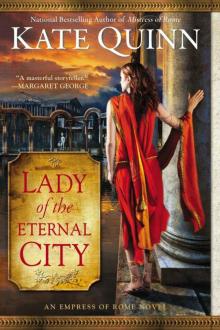 Lady of the Eternal City
Lady of the Eternal City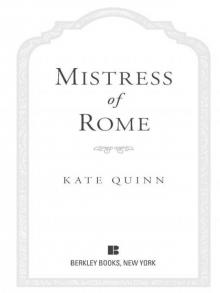 Mistress of Rome
Mistress of Rome Daughters of Rome
Daughters of Rome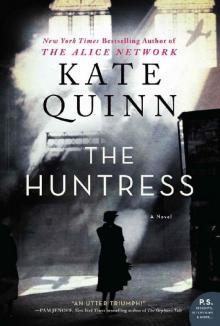 The Huntress
The Huntress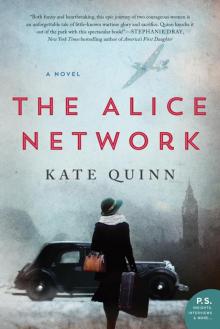 The Alice Network
The Alice Network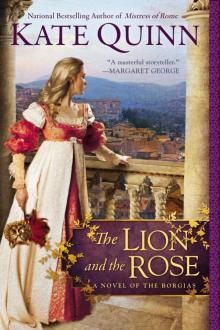 The Lion and the Rose
The Lion and the Rose Empress of the Seven Hills
Empress of the Seven Hills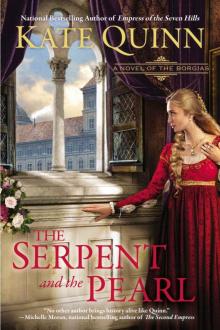 The Serpent and the Pearl
The Serpent and the Pearl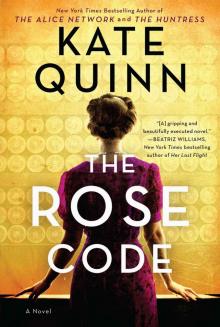 The Rose Code
The Rose Code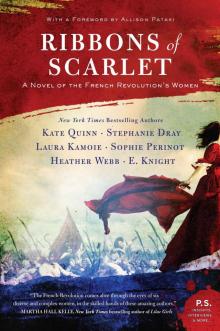 Ribbons of Scarlet
Ribbons of Scarlet A Song of War: a novel of Troy
A Song of War: a novel of Troy